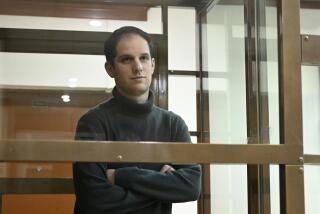25 Soviets to Be Out by Oct. 14, Reagan Vows
- Share via
WASHINGTON — President Reagan vowed Thursday that the 25 alleged spies in the Soviet Union’s U.N. Mission will return to Moscow by Oct. 14, and a senior Administration official said the Soviets will have a tough time convincing U.S. officials that those they want to stay are not spies.
More than half of the 25, who became an issue during negotiations over the release of American correspondent Nicholas Daniloff, already have left the United States, Reagan said at a briefing of journalists.
“We have granted them until Oct. 14 on others that they have presented a case that was hardship or a difficulty in their families . . . but the 25 will go by Oct. 14,” he said.
The Times reported Wednesday that Secretary of State George P. Shultz and Soviet Foreign Minister Eduard A. Shevardnadze had reached an understanding that seven of the 25, including the station chiefs of the KGB secret police and the GRU military intelligence service at the United Nations, would be allowed to complete their regular tours of duty.
But the senior Administration official said Thursday that the Soviets have asked the United States to reconsider expelling only “two or three.”
“If they can convince us that those are not spies--and I think that’s going to be a tough job--we will substitute names of other spies” who will be expelled, the official said.
In addition to the KGB and GRU chiefs, it was learned that Shevardnadze is urging that the Soviets be allowed to retain Gennady Mikhailovich Riabkov, who is listed on the mission roster as a first secretary but who is actually deputy chief of the GRU unit in New York.
The senior Administration official’s description of the outcome of the espionage cases involving Daniloff, Moscow correspondent for U.S. News & World Report, and Gennady F. Zakharov, a Soviet employee of the U.N. Secretariat, contrasted with that of other U.S. officials involved in the matter.
Daniloff was freed from detention in Moscow on Monday, without having to stand trial, while Zakharov pleaded no contest to espionage charges in New York on Tuesday and was ordered to leave this country.
Officials critical of the exchange said that the Zakharov case represented a rollback of the U.S. policy in effect since 1978 of fully prosecuting Soviet Bloc intelligence operatives who lack full diplomatic immunity. They noted that, in a break from Justice Department policy, the government did not submit a detailed statement of proof in the Zakharov case.
But the senior Administration official described the Zakharov case and the requirement that the 25 other alleged spies leave the country as “a severe blow to the KGB.”
The 25 alleged spies who operate out of the Soviets’ U.N. Mission include “leadership and top management personnel from the most important Soviet espionage apparatus in the United States,” the senior official said.
He said that the United States made clear to the Soviets that “we hold the high cards” and would not be reluctant to use them if they retaliated against the U.S. expulsion order. “There are far more Soviet officials at risk in the United States than U.S. officials in the Soviet Union, . . . roughly 900 vs. 200,” he said.
About two-thirds of the Soviets are associated with the United Nations and the Soviet U.N. Mission.
“We assume that the KGB could do the numbers and draw their own conclusions, but we made certain that they focused on that issue,” the official said. “The message was: ‘End it. Cut your losses. Damage will accelerate if you persist.’ ”
Shultz, talking with reporters at the United Nations, said Shevardnadze had told him that two or three of the 25 “were essential to him as he prepared for his duties here at the U.N. I said I could understand that, but you (Shevardnadze) will be leaving the U.N. Tuesday, so you wouldn’t need them long. But we will discuss that” at the superpower meeting in Reykjavik, Iceland, Oct. 11-12.
Eleven of the 25 Soviets that the United States has contended are spies remain at the United Nations, according to a U.S. source familiar with the matter.
It was learned Thursday that they include, in addition to the KGB and GRU station chiefs and the GRU deputy chief:
Valery Ivanovich Anikeyev, a KGB line chief, listed officially as a counselor; Viktor Vasilyevich Sbirunov, a senior KGB officer, listed as a first secretary; Vladimir Vasilyevich Pustovalov, a KGB officer, listed as an attache; Sergei Mikhailovich Mezentsev, a senior KGB officer, listed as a first secretary; Gennady Pavlovich Tarasov, a KGB officer, listed as an adviser to the Soviet representative to the U.N. Security Council; Leonardas Antanovich Yanavichyus, a KGB officer, listed as a second secretary; Gennady Fyodorovich Voytenkov, a KGB officer listed as an attache; and Alexander Nikolayevich Ushakov, a KGB officer listed as an attache.
More to Read
Sign up for Essential California
The most important California stories and recommendations in your inbox every morning.
You may occasionally receive promotional content from the Los Angeles Times.












